UN News/Daniel Dickinson Police officers staff a checkpoint on Highway 1 in the north of Thailand.
The effort is centred on the Golden Triangle, where the borders of Thailand, Myanmar, and Laos meet and from where illicit items including drugs are trafficked to lucrative markets across Southeast Asia.
UN News spoke with Jeremy Douglas, the Regional Representative of the UN Office on Drugs and Crime (UNODC) for Southeast Asia and the Pacific, on a mission to the border area.
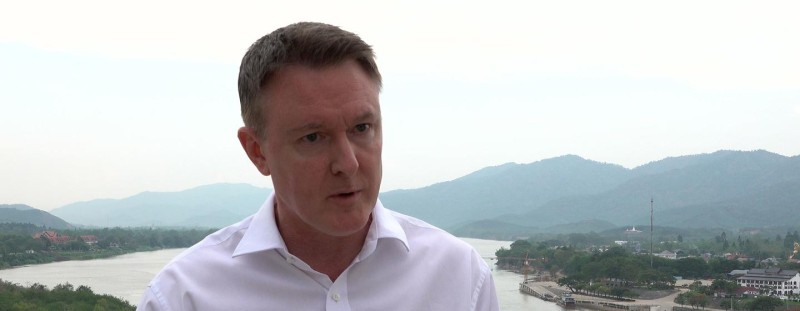
UN News/Runa A Jeremy Douglas, UNODC’s Regional Representative for Southeast Asia and the Pacific, at the Golden Triangle in Thailand.
Jeremy Douglas: I’m standing in northern Thailand, in the Golden Triangle, with Laos and Myanmar directly behind me on the banks of the Mekong River. It’s one of the biggest drug trafficking corridors in the world. In Shan state, Myanmar, there is the major production of heroin and opium, but also synthetic drugs like methamphetamine which are spilling out across the region and feeding the whole of the Asia Pacific [region], basically from Japan all the way down to New Zealand and everywhere in between.
There are complex governance issues inside Myanmar with a lot of fragmented groups controlling different territories. Drug production is happening in these often very remote areas where the borders are open and porous; it’s really easy to traffic items in and out of Myanmar, so that poses challenges for its neighbours.
UN News: How is the drug trade evolving in this region?
Jeremy Douglas: What we’ve seen over the past decade and really pronounced over the last three to four years is a drop off in traditional plant-based drugs. There has been a slight resurgence in opium since the military takeover in Myanmar, as farmers are returning to cultivating the drug after losing other livelihood generating activities. Nonetheless, we see a downward trend overall in terms of plant-based drugs.
We also see a huge surge in synthetic drugs produced by organized crime networks, which have migrated their operations from other parts of the region because they can operate with relative impunity. They have invested in building big drug producing facilities.
UN News: What type of new response does this require?
Jeremy Douglas: It requires that governments cooperate at various levels, especially frontline cooperation at the borders where the trafficking is taking place. This means sharing information and conducting joint operations to stop the delivery into Myanmar of chemicals needed to manufacture synthetic drugs and to prevent the trade of hundreds of tons of drugs the other way.
You also need to deal with the business of organized crime, including money laundering and all the other nasty elements that are associated with trafficking of a range of different items, including wildlife products, arms, and even human trafficking.
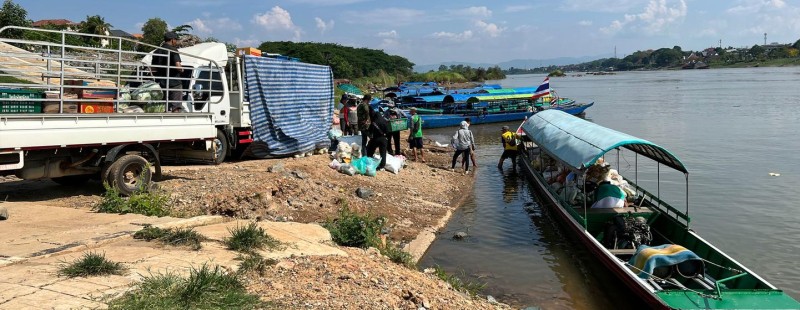
UN News/Daniel Dickinson Goods are loaded onto a boat in Laos to be transported across the Mekong river to Thailand.
UN News: How important is that collaboration?
Jeremy Douglas: Collaboration is fundamental, as transnational criminality is a shared responsibility. Coordination and cooperation are crucial, as a rapid response is often needed at these border points. This is why UNODC has supported the establishment of around 120 border liaison offices, or BLOs, across the region which allow law enforcement agencies to share information and take action.
This collaboration is working; our Thai colleagues have highlighted a number of cases of human trafficking, migrant smuggling as well as drugs, timber, and arms trafficking which they have disrupted with the help of colleagues in different BLOs.
In Laos, officers there have been the first to identify an emerging global trend. The chemicals used to make synthetic drugs are called precursors, and these are being trafficked into the illegal labs. Now our colleagues in Laos have uncovered the trafficking of so-called pre-precursors – chemicals that are used to make the precursors.
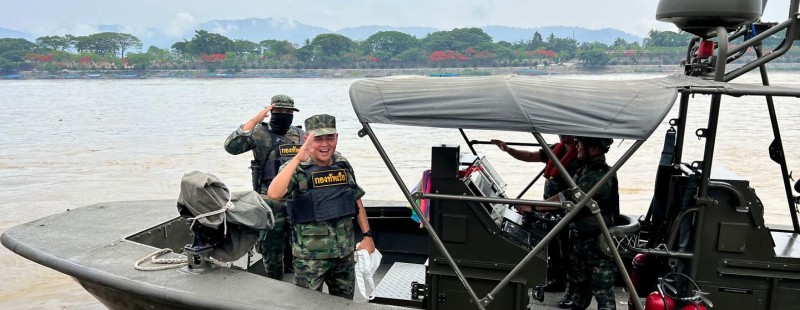
UN News/Daniel Dickinson The Thai navy has been operating joint patrols in the Mekong region with counterparts from China, Laos, and Viet Nam.
UN News: What are the challenges the BLOs face?
Jeremy Douglas: They need to be supported to evolve and adapt to a crime environment which does not remain static. Law enforcement officers need to understand the latest trends, to have the latest information, so they know what to expect and how to deal with it.
Tweet URL
Crucially, these networks also need political support. It can be challenging for States to collaborate on these types of non-traditional security issues, as they are often viewed as very sensitive national issues. So that’s where the UN can step in and play a special role to help facilitate dialogue between States.
The fact that governments and local law enforcement agencies are proactively sharing information is a great success and a credit to the UN.
UN News: How does illegal trafficking in this relatively small area connect with the bigger transnational, regional, and global organized crime context?
Jeremy Douglas: The organized crime trafficking organizations that dominate the Asia Pacific region, play a global role in the drug trade and other illicit activities. They look for safe havens where it is easier for them to do business and operate with impunity.
They look for chaos, the lack of governance, porous borders, and this they can find in parts of the Golden Triangle. So really, it’s an organized crime haven.
UN News: How does the work that takes place here connect or affect people living in other parts of the world?
Jeremy Douglas: The drugs that are manufactured here make it as far as the Pacific, New Zealand, Australia, and Japan, so we see very powerful narcotics on the streets of Sydney or Tokyo that lead to addiction and all the destructive impact they have on individuals, families, and the broader society.
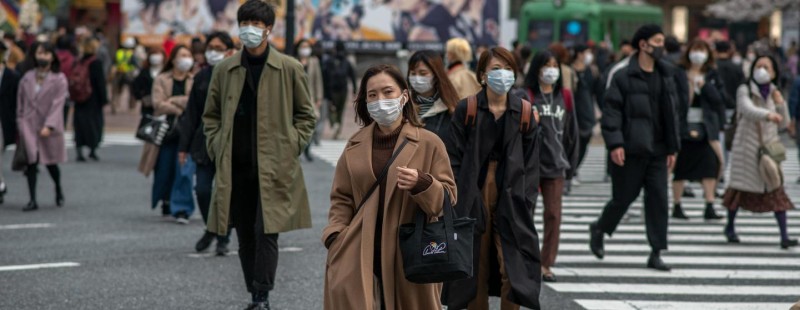
© ADB/Richard Atrero de Guzman Synthetic drugs trafficked out of the Golden Triangle end up on the streets of Tokyo, Japan (pictured) and other markets in Southeast Asia.
UN News: How transferable is this model that UNODC has established to other parts of the world?
Jeremy Douglas: It’s definitely a transferable concept. UNODC is working on a similar network in Central Asia and northern Africa. But, there are other places in the world, in Africa and in Latin America, which would really benefit from following the excellent model set here in Southeast Asia, for example, southern and Central Africa has substantial cross-border crime.
We see much more heroin in southeastern Africa, with heroin moving by sea into East Africa and then across land borders. And in Latin America, the cocaine trade is a cross-border transnational trade in which cocaine is passing through Ecuador, from the growing countries Colombia and Bolivia, and onwards to the Balkans in Europe. So, there’s much work to be done.
Quick facts on border liaison offices (BLOs)
- Some 120 BLOs have been established across Southeast Asia.
- BLOs are established in pairs – on either side of an international border crossing.
- BLOs address myriad cross-border issues, including drug and precursor chemical trafficking, migrant smuggling, human trafficking, wildlife and forestry crime, and, in some locations, the movement of terrorist fighters alongside public health and pandemic-related matters.
- The BLO network works to enhance relationships between the law enforcement and border communities, community policing efforts, and the role and leadership of women in law enforcement agencies.
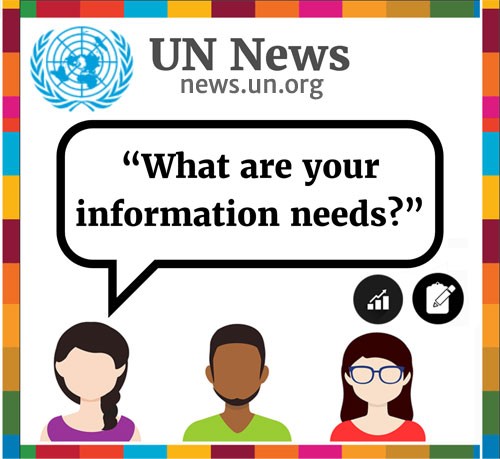
2023 UN News User Survey
Thank you in advance for agreeing to participate in our survey so we can improve and tailor our products to your needs. The survey will take no more than 4 minutes to complete.

